Decision Spread
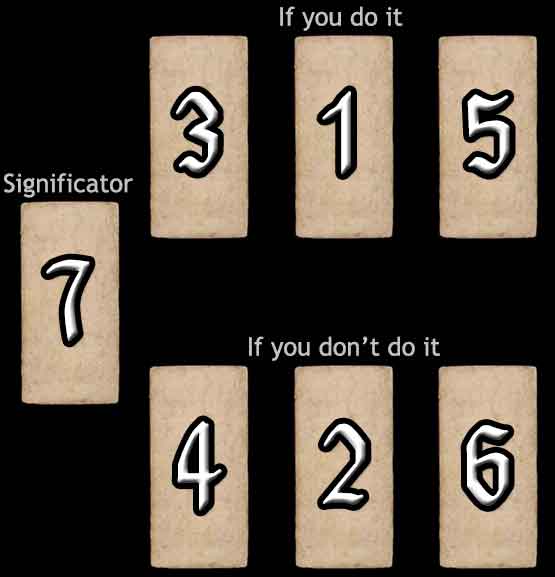
Difficulty: Easy
This simple but highly useful spread calls for a question to be asked in this format:
'What happens if I do (X), and what happens if I do not do (X)?'
Please note that it should not be viewed as a decision between two different options, but about whether a single option should be exercised or not. A second option would call for a separate reading.
Card #7 is the significator, the overall theme of the query.
Cards #3, #1, & #5 represent the chronological sequence of events that occurs if the reader chooses to do (X).
Cards #4, #2, & #6 represent the chronological sequence of events that unfolds if the reader chooses not to do (X).
Your Decision Reading
The Significator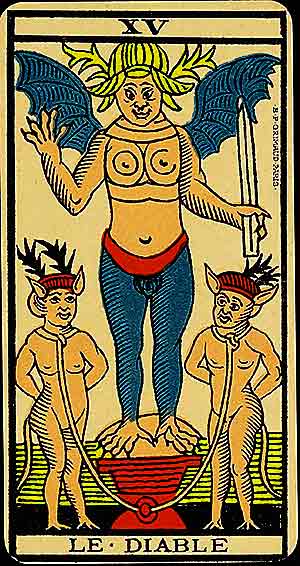 XV – The Devil (Lost card, substituted here) |
Outcome if you do it: | ||
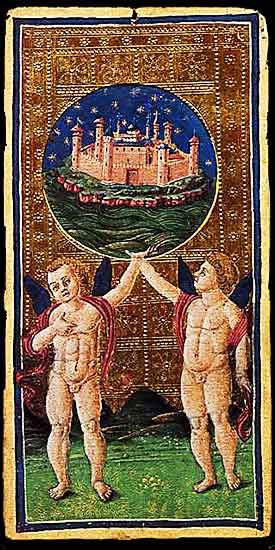 XXI – The World |
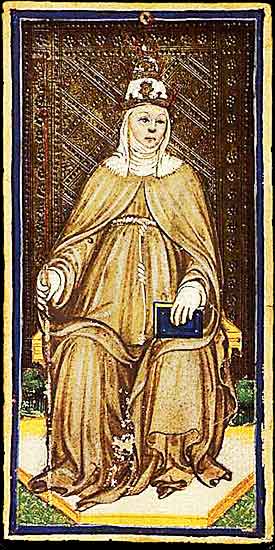 II – The Popess |
 XI – Strength |
|
| Outcome if you don't do it: | |||
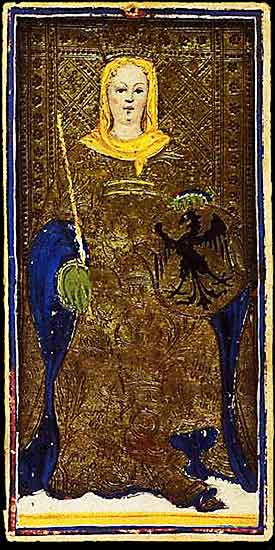 III – The Empress |
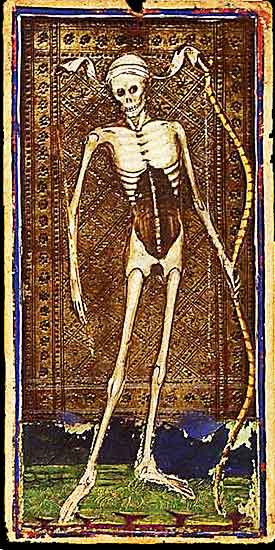 XIII – Death |
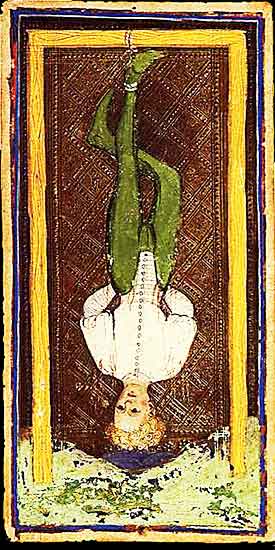 XII – The Hanged Man |
|

XV – The Devil (Lost card, substituted here)
This card no longer exists, so the Marseille version is filling in. The Devil represents bondage, temptation, and the shadow self. It highlights the chains we impose upon ourselves through fear, obsession, or indulgence, urging us to confront these darker aspects to reclaim our freedom.
Symbolism: The Devil embodies primal instincts and the seduction of material or carnal desires. The chained figures symbolise voluntary entrapment, their loose bindings reminding us of the ability to escape our vices. The pedestal signifies false power, while the scene hints at the potential for redemption through self-awareness.
In Relationships: The Devil warns of unhealthy attachments, jealousy, or manipulative relationships. It challenges you to examine whether passion has turned into obsession.
In Work: This card can signify being trapped in a toxic work environment, greed, or overreliance on material success. It urges you to reflect on what fulfils you.
Spiritually: The Devil calls for self-awareness and shadow work. Confronting your inner fears or desires will lead to personal liberation.
When ill-dignified: When reversed or ill-dignified, the Devil signifies breaking free from constraints, overcoming addiction, or realising what binds you.
Outcome if you do it:

XXI – The World
The World represents completion, wholeness, and the harmonious integration of all aspects of life. It is the last card of the Major Arcana, signalling the end of one journey and the beginning of another.
Symbolism: The two ethereal figures holding the globe or portal represent the union of duality and the achievement of balance. The rolling plains and distant mountains beneath the golden sky symbolise the vast potential of the world, and the figures' gesture of offering suggests a celebration of accomplishment. The card evokes cosmic harmony, completion, and the endless cycles of existence.
In Relationships: The World signifies a complete and fulfilling relationship, one where both partners are in harmony and balanced with each other. It's a time of celebration and unity.
In Work: Completion of a major goal or project. The World indicates the successful culmination of efforts, with new horizons opening up in your professional life.
Spiritually: A time of wholeness. The World signifies a sense of fulfilment and oneness with the universe, representing the final stage of spiritual evolution.
When ill-dignified: Incompletion, being stuck, or an inability to move forward. This card warns of a lack of closure or an unfinished journey that hinders your growth.

II – The Popess
The Popess signifies intuition, mystery, and hidden wisdom. She represents the need to look inward and trust one's inner voice while respecting the unknown and unseen.
Symbolism: Her veil and book symbolise the sacred mysteries she guards. The golden background elevates her presence, while her fancy robes reflect the complexity of her spiritual knowledge. Her composed demeanour conveys her role as a keeper of divine truths.
In Relationships: A time to trust your instincts. The Popess may suggest unspoken feelings or the need for patience.
In Work: Hidden opportunities or knowledge may come to light. Use intuition and discretion when making decisions.
Spiritually: A call to explore inner wisdom and the mysteries of life. Trust the subtle guidance of intuition.
When ill-dignified: Secrets, deception, or an overreliance on logic at the expense of intuition.

XI – Strength
Strength symbolises courage, patience, and the mastery of inner power. It reflects the triumph of compassion and self-control over brute force.
Symbolism: The figure's calm restraint of the lion reflects the balance of strength and gentleness. Her finely detailed garments and the rendering of the lion's mane reflect Renaissance artistry, while the golden background elevates the scene to a symbolic level.
In Relationships: A time to practise patience and understanding. Strength signals harmony through compassion.
In Work: Success through persistence and confidence. Strength encourages inner resolve rather than aggressive tactics.
Spiritually: Strength represents mastering the ego and cultivating inner peace through compassion.
When ill-dignified: Aggression, self-doubt, or weakness. It warns against succumbing to fear or forceful behaviours.
Outcome if you do not do it:

III – The Empress
The Empress symbolises abundance, creativity, and nurturing energy. She represents the generative force of nature and the ability to create and sustain growth, both literally and figuratively.
Symbolism: The Empress's sceptre and crown symbolise her authority, while her shield connects her to the Visconti family lineage. The floral embroidery on her gown reflects her connection to nature and fertility. The golden background underscores her divine and regal status.
In Relationships: A time of emotional abundance and nurturing. The Empress signals love, harmony, and growth.
In Work: Creative projects flourish under the Empress's guidance. She encourages nurturing ideas and building strong foundations.
Spiritually: The Empress represents the divine feminine, inviting the seeker to embrace growth and connect with nature's rhythms.
When ill-dignified: Stagnation, overindulgence, or a smothering presence in relationships.

XIII – Death
Death signifies the inevitable conclusion of one cycle and the heralding of another. It's a powerful symbol of transformation, renewal, and the necessity of endings to foster new beginnings.
Symbolism: The skeletal figure with a scythe represents the impartial and unrelenting nature of time and change. The image of fallen bodies suggests the end of a phase, but the subtle floral designs interwoven with the scene offer hope, symbolising rebirth and the cyclical nature of existence. The golden background emphasises the universal truth of transformation and the inevitability of all life cycles.
In Relationships: This card suggests the end of an old emotional pattern or relationship, clearing the way for renewal. Let go of what no longer serves you to make space for new, healthier connections.
In Work: Death marks the close of one professional chapter. It's a time for endings, making way for new opportunities and growth. Embrace the transition instead of fearing it.
Spiritually: Death calls for a transformation, letting go of old beliefs or attachments. Spiritual rebirth requires an embrace of the unknown and a surrender to the cycles of existence.
When ill-dignified: Resistance to change, stagnation, and fear of letting go. This can manifest as clinging to the past or an inability to move forward, hindering growth.

XII – The Hanged Man
The Hanged Man represents a moment of suspension, transformation, and the profound wisdom of surrender. It is the card of acceptance, urging one to release control and embrace a new perspective, even at the cost of discomfort.
Symbolism: The figure's suspended position signifies the state of hanging between worlds, a soul caught in the liminal space between the old and new. The calm expression of surrender contrasts with his precarious state, highlighting the necessity of letting go to gain understanding. The patterns of his tunic, combined with the golden glow, evoke a sacred pause in time, elevating this card to a spiritual level.
In Relationships: A time to step back and reassess your emotional life. Patience, understanding, and self-reflection are required. The card suggests moments of stillness can lead to profound growth in relationships.
In Work: Professional progress comes through rethinking old strategies. The Hanged Man indicates that a temporary pause or a shift in perspective can lead to breakthroughs.
Spiritually: The card speaks to spiritual enlightenment through sacrifice and release. You are called to surrender to the flow of life and gain higher wisdom.
When ill-dignified: Resistance to change, stagnation, and a refusal to let go. This warns against being trapped by fear or obstinance, preventing personal growth.